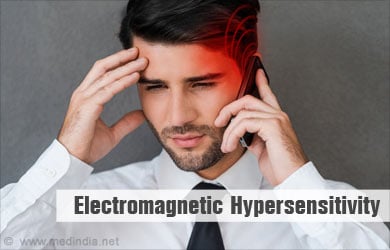- Health Implications of Electromagnetic Fields, Mechanisms of Action, and Research Needs - (http://dx.doi.org/10.1155/2014/198609)
What is Electromagnetic Hypersensitivity?
Electromagnetic hypersensitivity is a condition where a person suffers from symptoms due to even low exposure to electromagnetic fields. The symptoms occurs only in the sensitive person and not in all others exposed to the same radiation.
We live in a wireless world today. Nearly everyone has a mobile phone close to our bodies, which sends and receives electromagnetic signals. A minute without Wi-Fi for those who are used to it seems like they have been transported into outer space. Our homes are equipped with latest electrical gadgets like microwaves, refrigerators, televisions, and name what you may. Our homes and work places are often located close to high-voltage substations and power transmission lines.

The electromagnetic waves emitted by the devices around us cannot be seen, but it is possible that they cause some effect on the human body. One of these possible effects is electromagnetic hypersensitivity.
Electromagnetic hypersensitivity is also called idiopathic environmental intolerance attributed to electromagnetic fields (IEI-EMF). Patients report a variety of symptoms related to the skin and other parts of the body which they attribute to electromagnetic fields.
Current information is not adequate to conclude about the ill-effects of electromagnetic fields on the human body. However, though the condition cannot be proven, it should not be dismissed either.
What are the Causes of Electromagnetic Hypersensitivity?
Electromagnetic hypersensitivity refers to ill-effects of relatively-low exposure to an electromagnetic field (EMF). The symptoms occur only in sensitive individuals and not all who are exposed to the radiation. Patients report a reaction when they are close to electrical lines, computers, power stations, radars, mobile phones, mobile phone base stations, cordless phones, microwave ovens and /or automated devices.
It is possible that these individuals complaining of electromagnetic hypersensitivity are excessively conscious about odor, noise and other nuances in the environment. They may have a tendency to pay more attention to the surroundings and their possible ill-effects on health. This may be especially true if they also suffer from conditions like anxiety. Thus, patients may suffer from generalized environmental hypersensitivity rather than sensitivity to electromagnetic fields alone.
What are the Symptoms of Electromagnetic Hypersensitivity?
Symptoms of electromagnetic hypersensitivity appear only in some individuals and not all who are exposed to the electromagnetic field. Symptoms may reduce if the person is removed from the electromagnetic exposure. In addition, symptoms are nonspecific and vary among individuals.
Symptoms reported by patients that could be due to electromagnetic hypersensitivity include:
- Skin reaction with itching, redness, swelling of skin and rashes, especially on the face
- Headache, fatigue
- Vertigo, dizziness and nausea
- Heart palpitations
- Digestive disturbances
- Psychological problems like depression and even suicidal tendencies
- Poor sleep quality, difficulty with concentration

How is Electromagnetic Hypersensitivity Diagnosed?
Symptoms reported as due to electromagnetic hypersensitivity are perceived by the patient as being caused by the mobile phone, computer or other electronic or electrical device, as revealed on an interview with the patient. There is no reason to doubt the occurrence of the symptoms. At the same time, it is not possible to confirm that the symptoms are caused by the electromagnetic fields since there is no test to diagnose electromagnetic hypersensitivity. A definite diagnosis is also difficult since not everybody reacts to the same amount of exposure. Therefore, it is first important to rule out other causes of the symptoms before a diagnosis of electromagnetic hypersensitivity can be made. Home and workplace should be inspected so that the influence of environmental factors like noise, poor lighting, etc. on the patient can be evaluated.
How do you Treat Electromagnetic Hypersensitivity?
Patients with electromagnetic hypersensitivity should be offered treatment since they are often disabled by the condition. They should be explained the current factual evidence of the condition.
Symptoms of the patient should be treated with appropriate medications. Cognitive behavioral therapy and stress reduction techniques may help the patient to deal with any anxiety associated with the condition. Some patients may benefit from shifting their work or home place.

How do you Prevent Electromagnetic Hypersensitivity?
Some ways to prevent electromagnetic hypersensitivity in susceptible individuals are as follows:
- Keep away from the source if possible. For example, if the person stays close to a mobile tower, increasing the distance may be beneficial. There are people who have shifted to electromagnetic-free zones due to the hypersensitivity
- Several devices may be commercially available that claim to provide protection to a person from the electromagnetic field. However, their usefulness at present is doubtful and therefore not recommended
Health Tips
Some health tips to reduce electromagnetic fields around you are as follows:
- Text more often that you talk on the mobile phone.
- Do not keep your mobile under your pillow while sleeping
- Do not give your child a mobile
- Use of hands-free mobile devices can increase the distance between the phone and the ear / brain, thereby reducing the adverse effects
- Switch off your wireless routers when not in use and at night








